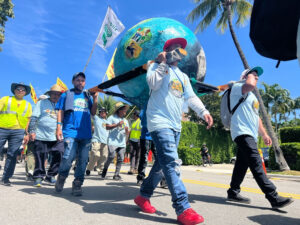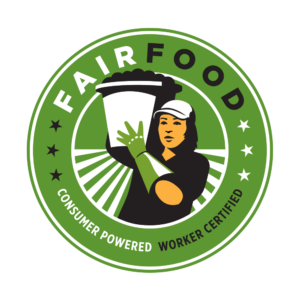Amid tough political climate, the Coalition of Immokalee Workers tours Florida cities.
By Johannes Werner
Original Air Date: March 26, 2025
Host: Nelly Rodríguez has picked asparagus, fruit and cucumber in Michigan, tomato, bell peppers and eggplant in Florida, and she has worked in restaurants in Immokalee off-season to make it possible to stay involved with the Coalition of Immokalee Workers when there are no harvests and farm jobs. Now, she is an emissary for this one-of-a-kind organization that has made a difference not just for tomato pickers. We interviewed Ramirez after a presentation to the Sarasota Unitarian Universalist Church this weekend.
Johannes Werner: You get to Immokalee by taking State Road 82 inland from Fort Myers. The unincorporated town of 25,000 not only produces an outsized proportion of the nation’s tomatoes—particularly in winter—but it also is a hub for strawberries, bell peppers, watermelons and cucumbers.
Farmworkers are among the lowest paid and most abused of any workers, but Immokalee is the site of one of the most successful models of farmworker organizing anywhere. Thanks to the participation not only of workers and farmers but of the corporations that are the final buyers, the Coalition of Immokalee Workers’ Fair Food program has funneled an extra penny per pound of tomato into the pockets of pickers and enforces workplace rules that have not been respected in the past. That model is now being replicated not just in the United States but in Scotland, Chile and Bangladesh.

CIW farmworkers carry the world on their shoulders.
Almost exactly a year ago, the Coalition celebrated its 30th anniversary with a Freedom Festival—not in Immokalee, but at the end of a march with thousands of participants in Palm Beach, just blocks from Mar-a-Lago.
Today, Immokalee is the site of immigration enforcement raids. Asked about the current atmosphere in town, Nelly Rodríguez does not go into details. She describes it as politics by just another president, and quickly pivots to the Coalition’s continued organizing efforts.
Nelly Rodríguez: It’s just another administration that’s coming in, or that is still there. For us workers, we just have to continue to work and take good care of ourselves. That’s what matters. That’s why it’s important that a growing number of consumers and also corporations join the Fair Food program. Why? Because it’s a good option to protect the rights of workers—the human rights of workers. Strengthen the program with more participation by consumers and corporations to protect the rights of those of us who work in agriculture.
JW: The beauty of the Fair Food program, Rodríguez suggests, is that it does not depend on the government, but rather on corporations—such as Taco Bell, Burger King, Walmart, Whole Foods and others—that seem to be committed despite changing political winds.

Nelly Rodriguez
NR: It does not depend on each administration that governs this country. It’s a program that depends on the power of corporations. We now have 14 corporations, and we keep expanding the model to other products and also to other countries.
JW: However, the Fair Food program did take a hit when the Trump administration recently canceled Department of Agriculture grants for farmers who joined the program. Rodríguez says some growers dropped out as a result even though they liked it.
NR: Thanks to these grants, the growers brought the program to their farms. They have seen the results of a transparent program, a program under which they benefit from legal agreements with corporations. And these corporations stick to it. Some of them have been with us since the year 2000. They also have seen that the program benefits them, as well as the farmers. The workers are happier, and they’re with them for longer periods of time. There’s a group of farmers that meets once a month, to see how they can improve bad work conditions.

“Consumer powered.
Worker certified.”
JW: Deportation proponents in Florida have suggested replacing undocumented farmworkers with guest workers under the H-2A visa program. But these programs have been around for years, and they have been rife with abuse. That is on display in a trial underway in federal court in Georgia against a ring of contractors who brought 70,000 farmworkers to the Southeast, earning the contractors an estimated $200 million in the process. Migrant workers from Mexico had to pay up to $4,000 to be accepted, and they first had to pay off the debt working for one employer, sometimes locked up during off-hours in squalid housing and being threatened with guns while at work with their visa and passport held hostage for ransom. If they ran away to work for someone else, their families at home would be threatened.
NR: No worker, no matter their nationality or migratory status, deserves being threatened with guns, having their families threatened, being charged excessive amounts for the visa, to be submitted to this uncertainty—“I don’t have any money, what’s going to happen to my family?”—like in those cases that recently happened in Georgia. We are against these kinds of injustices, and we don’t know whether this might happen again.

Spring of Consciousness promotional graphic.
JW: This year, the Coalition started a new outreach program called Spring of Consciousness. It was the reason Rodríguez was in Sarasota, as one stop in many Florida cities, speaking to a room full of Unitarians eager to learn about the Fair Food program and organizing a field trip to Immokalee in April. The idea behind Spring of Consciousness is to educate consumers and connect again with congregations, colleges and other community groups as allies.
CE raids or not, the Coalition recently held its annual Day of the Worker, a celebration with marimba music, folklore dancing and food in a big parking lot in Immokalee that draws hundreds of revelers.
NR: Every year, we do this to celebrate workers, to send the message that we are continuing with our lives and work, that we do not stop to exist, that we will not disappear from here. We do matter. We are important because of the work we do. We are human beings, we are here, and we deserve this kind of respect.
That is, by the way, the same parking lot where, until just a few years ago, contractor vans, trucks and buses picked up day laborers before dawn. Under the Fair Food program, growers now grant longer-term contracts to workers, and transportation is employer-provided. There is no more need for growers to scramble last-minute for pickers and for pickers to spend hours trying to find a new job every morning.
Reporting for WSLR, Johannes Werner.
WSLR News aims to keep the local community informed with our 1/2 hour local news show, quarterly newspaper and social media feeds. The local news broadcast airs on Wednesdays and Fridays at 6pm.